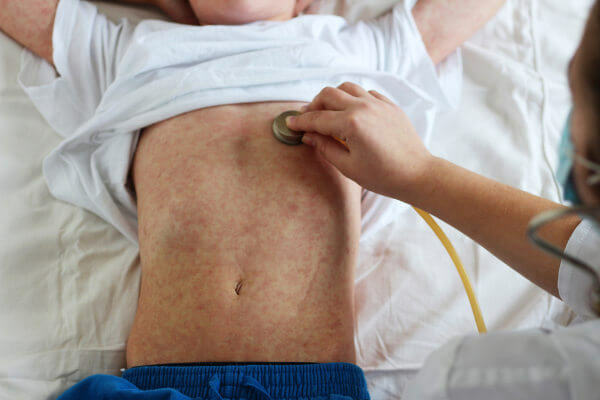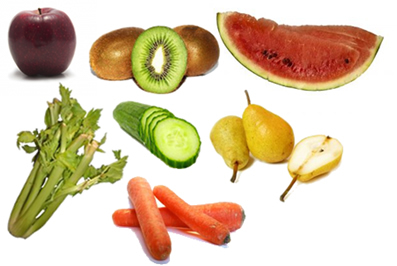O measles is serious and contagious infectious disease that deserves a lot of attention. Brazil, despite having received a certificate of elimination of the disease in 2016, returned to registering cases in 2018. Given this situation, it is essential to know even more about this disease and, therefore, we will answer below 10 common questions about measles.
Read too: Outbreak of measles in Brazil - learn more about this occurrence
1. What causes measles?
Measles is a infectious disease caused by a virus, that is, it is an example of virus. The measles virus belongs to the genus Morbillivirus, family Paramyxoviridae. It is a virus with an RNA genome.

Measles is a disease caused by an RNA virus.
2. How is measles transmitted?
measles is broadcast directly through respiratory droplets with the virus that are eliminated by the patient when sneezing, coughing and talking, for example. The period in which there is greater chance of disease transmission is between two days before the appearance of the spots on the body and two days later.
Read too:Contact Transmitted Diseases - Learn Five Examples
Do not stop now... There's more after the advertising ;)
3. What are the main symptoms of measles?
Fever high (usually above 38.5 °C);
Cough;
Coryza;
Conjunctivitis;
Red rash on the skin;
White patches on the mucous membranes (Koplik's patches).

Measles can cause fever and blemishes on the body.
4. Can measles trigger complications?
Measles can trigger a series of complicationsserious, therefore, a lot of attention to prevention is needed. According to the Ministry of Health, the main complications are the infectionsrespiratory,ear infections (ear infection), illnessesdiarrheal and illnessesneurological. Also according to the Ministry of Health, complications can leave sequelaeserious, such as blindness, deafness, growth problems and also decreased mental capacity.
5. Can measles kill?
The measles it can, yes, cause death. The worsening of this disease can cause death in both children and adults. According to the Ministry of Health, the incidence, clinical evolution and lethality of this disease are related to the nutritional, immune, socioeconomic conditions and those that favor crowding in public places and residences.
6. How is measles treated?
Unfortunately there is no specific treatment for measles. The drugs used only serve to treat disease symptoms and the resulting complications. It is noteworthy that, for children with the disease, the administration of vitamin Ain order to minimize the chances of complications occurring. This vitamin should be administered as soon as the diagnosis is made.
7. What are the ways to prevent measles?
The way to prevent measles is through vaccination. THE vaccine of the measles should be administered in childhood. Those who have not been vaccinated at the appropriate age can look for a health center to assess the status of this and other vaccines (See vaccination schedule in the next topic.).
Read too:Vaccines that all children should take
8. How many doses does the measles vaccine have?
O schemevaccine currently adopted consists of two doses of the vaccine against the disease. For people aged between 30 and 49 who have never received the vaccine, one dose is recommended. Below is a chart that shows how the vaccine should be given to people who have not received the vaccination.

It is noteworthy that, according to the Ministry of Health, the person who has already received two doses during life, triple or from tetra, no longer need to receive the vaccine. In addition, pregnant women, children under six months of age, suspected measles cases and immunocompromised patients should not receive the vaccine against the disease.
9. What is the name of the vaccine that protects against measles?
The vaccine that protects against measles is the tripleviral and the tetraviral. The MMR vaccine protects against measles, rubella and mumps. The viral tetra, in turn, protects against measles, mumps, rubella and also chickenpox (chickenpox). The current vaccination schedule recommends a dose of the triple viral vaccine at 12 months of age and another dose, but this time of the tetraviral vaccine, at 15 months of age.
Read too:Importance of vaccination
10. If a person does not remember if they had the vaccine, can they be vaccinated again?
The recommendation is that if a person does not have proof that they have been vaccinated against measles, they should be vaccinated. The Ministry of Health warns that the administration of the vaccine does not cause risks to the person's health.
By Ma. Vanessa Sardinha dos Santos
Would you like to reference this text in a school or academic work? Look:
SANTOS, Vanessa Sardinha dos. "10 Common Questions About Measles"; Brazil School. Available in: https://brasilescola.uol.com.br/saude-na-escola/10-duvidas-comuns-sobre-sarampo.htm. Accessed on June 27, 2021.



